by James Corbett
corbettreport.com
September 9, 2017
The leaders of the so-called "BRICS" nations converged on Xiamen in Southeast China this week to convene the Ninth BRICS Summit, the annual get-together for the association. And to the surprise of absolutely no one, the event kicked off with a joint declaration full of the usual mealymouthed dipolomatic gobbledygook that was immediately hailed by the members' state-run media mouthpieces as the start of the group's second "golden decade" and (say it with me) "paving the way for a new world order."
Yay.
But, buried in among all the feelgood diplobabble were a few nuggets of significance, as predictably undigestible as those nuggets may be.
Like the BRICS' reaffirmation of commitment to the UN and their "sustainable development" scam, Agenda 21/2030:
And their resolve to foster a "global economic governance architecture," complete with an obligatory curtsy and ring-kissing of their IMF/World Bank masters:
And their genuflection to the World Trade Organization:
Barf.
But, like it or not, the summit did generate some actual news worthy of some scrutiny, so in the interest of keeping you informed, here are the most important stories to emerge from this year's BRICS Summit.
Beijing Betrays Belt-and-Road Buddies?
One item from the joint declaration of actual news significance was buried halfway through the lengthy document, right after a discussion of the (in)security situation in Afghanistan. Blink and you'd miss it, but there in paragraph 48 is a little diplomatic bombshell alternately described as a "breakthrough" and a "betrayal."
"We, in this regard, express concern on the security situation in the region and violence caused by the Taliban, ISIL/DAISH, Al-Qaida and its affiliates including Eastern Turkistan Islamic Movement, Islamic Movement of Uzbekistan, the Haqqani network, Lashkar-e-Taiba, Jaish-e-Mohammad, TTP and Hizb ut-Tahrir."
For those unfamiliar with the groups named in this sentence and their affiliations, this otherwise innocuous clause condemning terrorism is a "breakthrough" for India, because they have tried (and failed) to get the BRICS to condemn Pakistani terror groups like the Haqqani network and Lashkar-e-Taiba (LeT) for some time now. Just the naming of these names as threats to the security of the region is a huge boost for India's position relative to its arch-nemesis, Pakistan, and is widely seen as diplomatic coup for New Delhi.
The sentence is seen as a "betrayal" by Pakistan, however, because that country had every reason to believe until now that it was in a blossoming relationship with China. They are partners in the highly lucrative China-Pakistan Economic Corridor (CPEC), after all, and Islamabad has been using Beijing as a diplomatic shield against Washington as Trump does his Obama Surge 2.0.
Indeed, it's hard not to see this clause as a clear win for India. Just a few months ago India was boycotting the Belt and Road Forum in protest of the CPEC and coming close to military confrontation with China over a seemingly insignificant mountain pass in Doklam, and now China has publicly chewed out their arch-rivals on the global stage. Don't expect China to completely abandon Pakistan politically, but this does indicate that Beijing is willing to use the stick as well as the carrot in their international dealings.
The Sidelines At Center Stage
At any major international summit, the bilateral meetings taking place on the sidelines of the main conference are where a lot of the real action can be found.
Once again the big winner of the sideline events appears to be Prime Minister Narendra Modi and the Indian people he claims to represent. After much "will they, won't they?" speculation it was finally confirmed that, yes, indeed, Chinese President Xi Jinping would meet with Modi for the two leaders' first substantive bilateral talks. Details of the deliberations were, as always, maddeningly vague, but at the very least indicated that the two powers are not on the edge of all-out warfare, as seemed possible during the Doklam standoff mere weeks ago.
One non-BRICS member getting in on the action was Egypt, with Egyptian President Abdel-Fattah al-Sisi meeting Russian President Vladimir Putin on the sidelines of the summit on Monday. The two discussed "boosting bilateral cooperation and other issues of mutual interest," including, understandably, the security situation at Cairo airport, scene of the October 2015 Russian plane crash that killed over 200 people, mostly Russians. Sisi also got to burnish his diplomatic credentials with a sideline meeting with Modi where the two, predictably, vowed to "strengthen ties."
BRICS Plus?
So what was Egypt doing at the BRICS Summit anyway? Or Mexico, Guinea, Thailand and Tajikistan, for that matter? Well, it's called "BRICS Plus," and it's a concept put forward by Chinese Foreign Minister Wang Yi last March. Employing the universal language of diplospeak, Wang explained that China wanted to "explore modalities" of an expanded BRICS grouping, adding: "We hope to establish extensive partnerships and widen our circle of friends to turn it into the most impactful platform for South-South cooperation."
That vision took shape at the Xiamen summit with China's invitation for "dialogue" with Mexico, Egypt, Guinea, Thailand and Tajikistan. The idea is to expand the BRICS' reach and bring more of the developing world into the fold.
The plan may have already hit a road bump, however. The idea has been heavily criticized by "existing members" (read: India) and China has reportedly backed off the idea to make these dialogue partnerships an ongoing part of the BRICS Summit. Of course, this by no means signals an end to China's interest in expanding the global reach of its diplomatic and economic ties, and India should tread carefully on ideas that expand the scope (and thus the relevance) of the BRICS. If the BRICS becomes an impediment to China's global ambitions it may just be left to wither on the vine.
No Nuking NK!
The real determinants of what happens on the Korean peninsula remain (much to the detriment of the Korean people) powers other than North or South Korea. Namely China and the US (and to some extent Russia and Japan). Given the Russian and Chinese backbone of the BRICS, it's no surprise, then, that the North Korean situation was one of the topics that was front and center at the shindig.
As the joint declaration put it:
"We strongly deplore the nuclear test conducted by the DPRK. We express deep concern over the ongoing tension and prolonged nuclear issue on the Korean Peninsula, and emphasize that it should only be settled through peaceful means and direct dialogue of all the parties concerned."
This remains the line in the sand for both Russia and China: There is no military solution to the Korean crisis.
Putin has floated an idea for a gas pipeline to Korea and the connection of the North and South Korean energy grid and railway systems (an idea that, incidentally, was first floated by Maurice Strong over a decade ago). Meanwhile, Xi is calling on France to get involved and give the whole situation a diplomatic restart. But both Xi and Putin are adamant: no military solution.
As Pepe Escobar puts it in his article on "The real BRICS bombshell:"
"Beijing has imposed a definitive veto on war – of which the Pentagon is very much aware.
"Pyongyang’s sixth nuclear test, although planned way in advance, happened only three days after two nuclear-capable US B-1B strategic bombers conducted their own 'test' alongside four F-35Bs and a few Japanese F-15s.
"Everyone familiar with the Korean peninsula chessboard knew there would be a DPRK response to these barely disguised 'decapitation' tests.
"So it’s back to the only sound proposition on the table: the RC 'double freeze.' Freeze on US/Japan/South Korea military drills; freeze on North Korea’s nuclear program; diplomacy takes over."
And Last but not Least...
The biggest news to emerge during the summit was not directly part of the summit at all, but in some way is a reflection of the topsy-turvy period of global geo-economic reorientation we are living through. I am referring, of course, to the yuan/oil/gold earthquake that is about to shake the monetary world.
If you saw my recent video on the subject you already know the story, but in a nutshell China is about to ring in a (say it with me) "new world order" with their Shanghai International Energy Exchange. The exchange will offer crude oil contracts denominated in yuan, which "will be fully convertible into gold on exchanges in Shanghai and Hong Kong." As Grant Williams points out in his important overview of the story (h/t Corbett Report user Ukdavec), the ability for a country like, oh, let's say, Russia, to sell oil to China directly for yuan (no dollars involved) and convert that yuan to gold effectively completely severs all the links to the US government, US banking system, US treasuries and US dollar that has underpinned the unipolar world of the post-Bretton petrodollar. It is difficult to overstate the significance of this event...
But, having said that, this story is beyond the bounds of this BRICS update. Suffice it to say, if the BRICS want to become the real beginning of an actually multipolar alternative to the US hegemony, something like the yuan/oil/gold triangle would have to be in place. And here it is. Fancy that.
Now, as always, I have to re-re-restate the ground level truth: The BRICS are a phoney opposition literally created by Goldman Sachs whose pseudo-alternative institutions are run by the very same bankers and bureaucrats they pretend to oppose. The cold war of the 21st century is being engineered in the exact same way that the cold war of the 20th was. And, as always, whichever "side" wins this "fight," the oligarchs and their systems of control will come out on top.
But make no mistake: the cold war, engineered as it is, is here. And meetings like the BRICS Summit are where we catch the first glimpses of it.
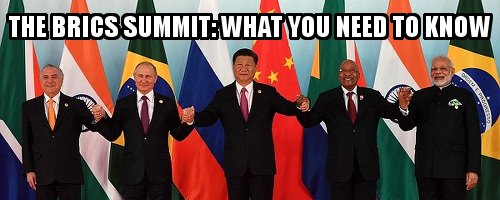
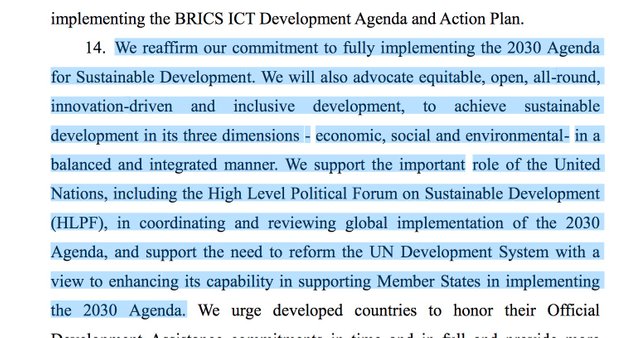
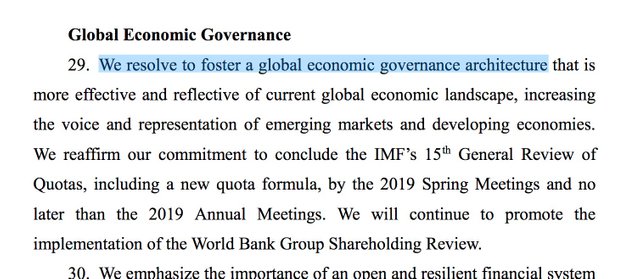
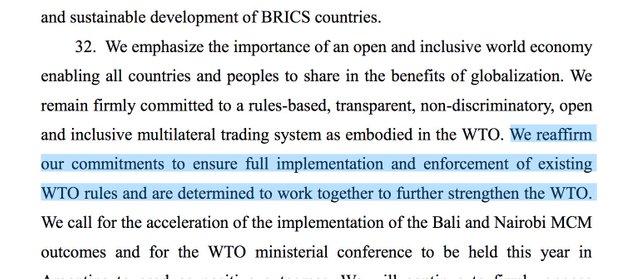
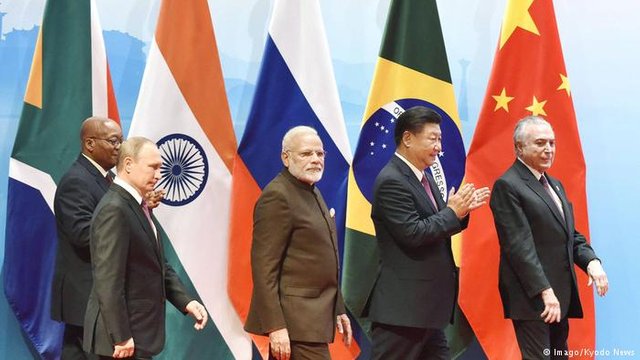
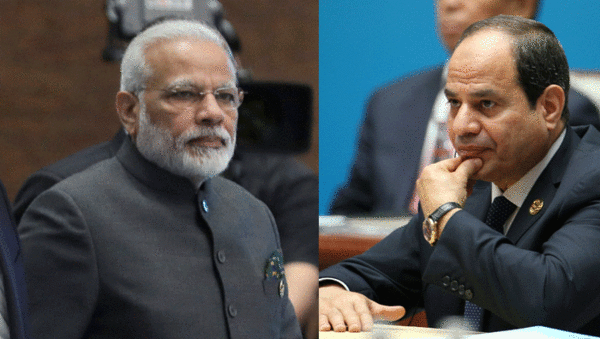
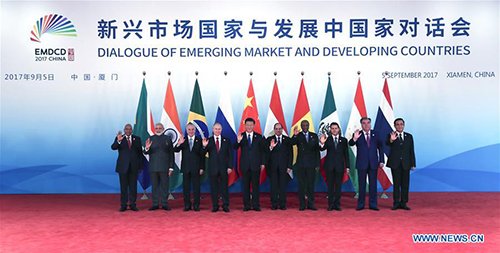
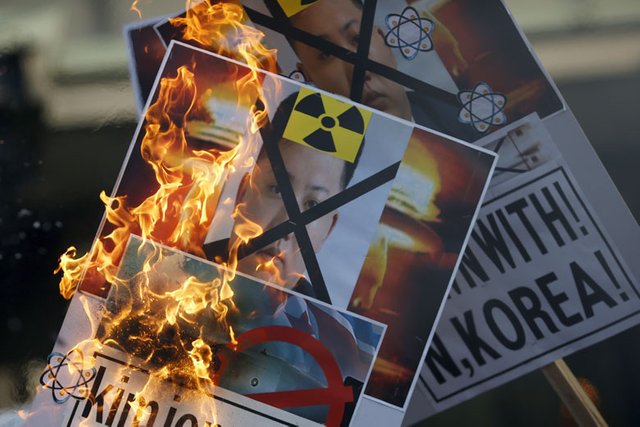
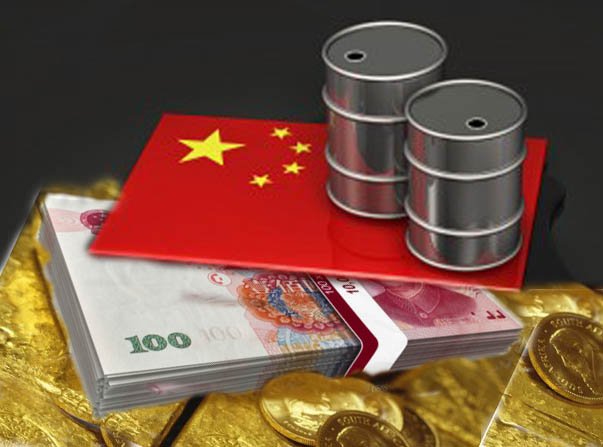
Nice post, thanks for sharing!
Downvoting a post can decrease pending rewards and make it less visible. Common reasons:
Submit
I also hope this country will adopt crypto like south korea.
Downvoting a post can decrease pending rewards and make it less visible. Common reasons:
Submit
Downvoting a post can decrease pending rewards and make it less visible. Common reasons:
Submit
Very informative graphic. The population figure seems a bit off, though. I'm thinking it should be in 100Ms, not Bs.
Downvoting a post can decrease pending rewards and make it less visible. Common reasons:
Submit
There's quite a bit of info here. Thanks for keeping an eye on meetings like these and reading between the lines.
Downvoting a post can decrease pending rewards and make it less visible. Common reasons:
Submit
You explained well what I had more intuitively foreboding, but I did not have enough information and adequate observation power.
"Now, as always, I have to re-re-restate the ground level truth: The BRICS are a phoney opposition literally created by Goldman Sachs whose pseudo-alternative institutions are run by the very same bankers and bureaucrats they pretend to oppose." PERFECT!
Downvoting a post can decrease pending rewards and make it less visible. Common reasons:
Submit
Thanks for the update, James. Great post!
Downvoting a post can decrease pending rewards and make it less visible. Common reasons:
Submit
So how long before the old system comes crashing down? I know the $'s already on its way: l
Downvoting a post can decrease pending rewards and make it less visible. Common reasons:
Submit
Sad but true!! Great post. Upvoting and Resteeming. Hopefully the "asleep" will finally awaken to the truth of their agendas. Thanks for sharing1
Downvoting a post can decrease pending rewards and make it less visible. Common reasons:
Submit